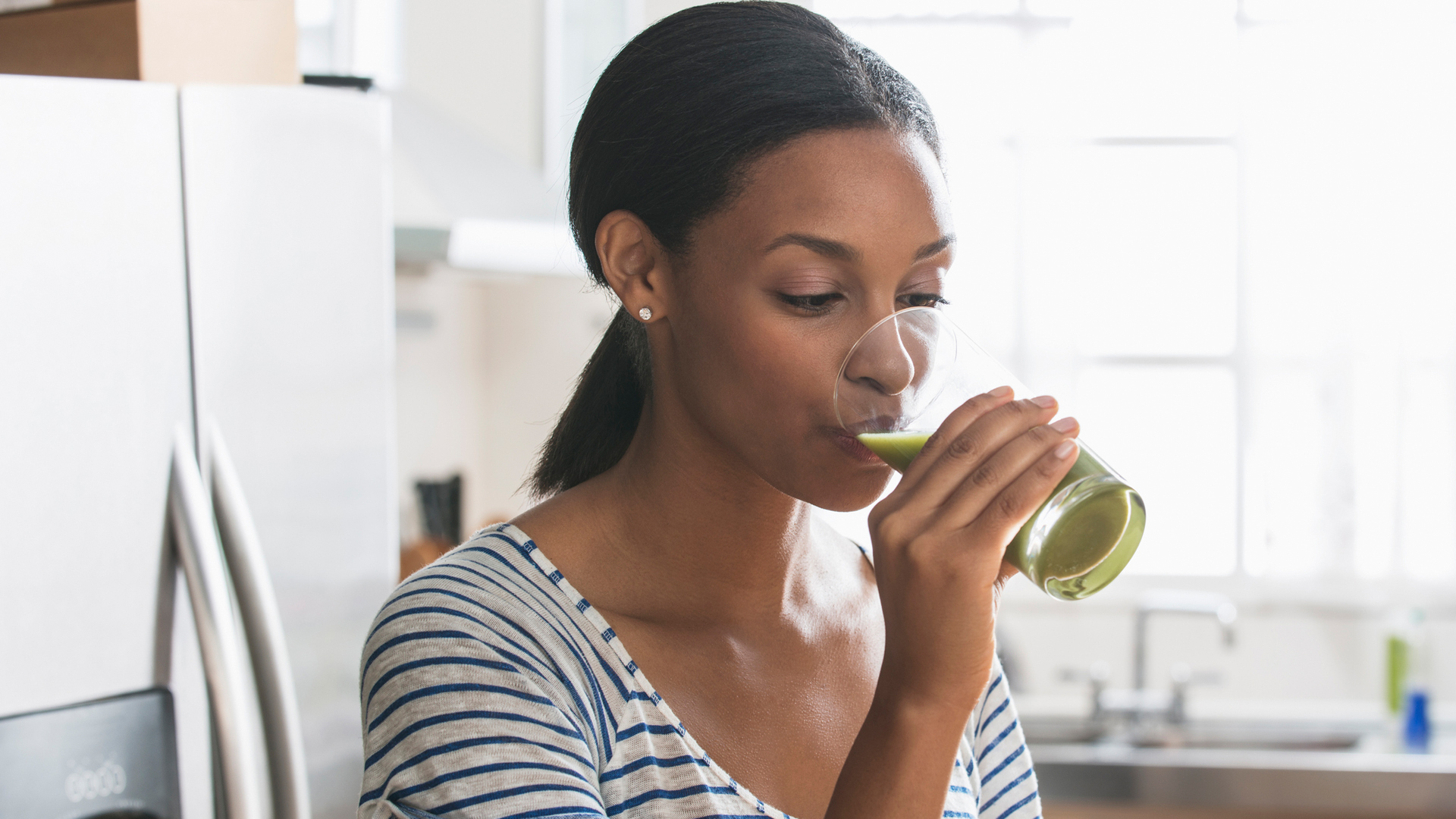Are meal replacement shakes healthy?
They may save time in the kitchen, but are meal replacement shakes healthy? We ask a dietitian to break down the pros and cons

In the world of weight loss, replacing meals with shakes seems fairly commonplace, but are meal replacement shakes healthy?
You may have seen meal replacement shakes on billboards, in magazines and down certain supermarket aisles, from low calorie shakes through to shakes that are aimed at helping you to gain weight – without a knife and fork in sight. In fact, if they’re not already pre-made, they will tend to be sold in powder form, which simply need mixing with milk or water.
These shakes come in various flavors, from chocolate through to vanilla, and even unflavored should you wish. They are filled with varying levels of calories, vitamins, minerals and macronutrients, including protein, fats and carbs. Some may be more fiber filled than others, whilst some shakes have been specifically tailored to meet certain individual’s needs.
If you’re hoping to start using the best meal replacement shake, there are several things to take into consideration, plus, your reason for wanting to take a meal replacement shake will dictate the shake you go for.
Here, we delve a little deeper into the pros and cons of meal replacement shakes, along with the expertise of dietitian Nichola Ludlam-Raine.
What is a meal replacement shake?
Meal replacement shakes are pretty much exactly what they say on the tin; they’re created to replace a meal or several meals, whether that be breakfast, lunch or dinner.
According to the Dietary Guidelines for Americans, 2020-2025, average daily calorie intakes should range from around 2,200-3,200 calories for adult men, and 1,600-2,400 for women. However, the calorie intake of each individual will vary greatly depending on their size, their activity levels and also their metabolism; some people do naturally just need more food to sustain their energy.
Ludlam-Raine explains that meal replacement shakes are balanced to “provide carbohydrates for energy, protein for repair, healthy fats and dietary fiber, as well as vitamins and minerals”.
“Some are what we call 'nutritionally complete' in a certain amount of shakes a day, meaning they are all you need to achieve recommended nutrient intakes,” she adds. “Others need supplementing; for example if someone replaces breakfast and lunch with two shakes, they would have three snacks and one healthy evening meal.”
She adds that this is often known as the 3,2,1 plan.
- Related: Is protein good for weight loss?
Meal replacement shakes: Pros
So, are meal replacement shakes healthy? There are several health-related benefits to meal replacement shakes.
One of them is the time they can save for certain individuals, such as those who want to lose weight.
“Meal replacement shakes are designed to help an individual to lower their calorie intake and take the pressure off food and meal prep. They're designed for people who don't want to think about what they're eating and just want to 'grab and go',” says Ludlam-Raine.
She adds that meal replacement shakes may be good for people who currently miss meals or for those who have recently had bariatric (weight loss) surgery such as a gastric bypass or sleeve.

For those wanting to lose weight, the calories out versus calories in equation is something that needs to be taken on board. Of course whilst there are some other factors that do come into play, calories are the fundamental factor within weight loss. One of the big benefits of meal replacement shakes is that the calorie equation is sorted already.
“Meal replacement shakes can help someone to lower their calorie intake by making it easier for someone to know exactly the amount of calories in each meal, as opposed to a calorie counting approach for three balanced meals, which can be time consuming for some,” adds Ludlam-Raine.
Meal replacement shakes can also be helpful for some to reduce weight in a short amount of time. In fact, research published in Current Nutrition and Food Science has found that replacing one or two meals a day with a meal replacement shake can speed up weight loss.
“Partial or total dietary replacements are often used to help reduce weight more rapidly which can be beneficial in some circumstances, for example helping to achieve remission in diabetes. Although this should be done under the supervision of a dietitian,” says Ludlam-Raine.
Meal replacement shakes: Cons
Whilst there are several benefits to meal replacement shakes, there are also some cons.
“Some people miss eating 'real food' when they're having meal replacement shakes and others may not like or be able to tolerate milk and most meal replacement shakes are based on skimmed milk,” says Ludlam-Raine.
Another pitfall to meal replacement shakes is that they are by no means a long term solution.
“They don't teach someone about healthy eating or help the adoption of healthy habits other than regular eating times,” adds Ludlam-Raine. Plus, meal replacement shakes can often be expensive and may not be as filling as a meal that requires chewing.

In fact, a study in Hormone and Metabolic Research found how a liquid meal is not only less satiating than a solid meal, but also, levels of the hunger-hormone ghrelin were lower after study participants ate a solid meal as opposed to a liquid meal.
“Due to the fact that meal replacement shakes aren't as satiating as chewing a meal, the evening meal and snacks need to be well prepared in order to achieve the calorie deficit required for weight loss,” says Ludlam-Raine. This may negate the time saving element of meal replacement shakes.
Another negative to meal replacement shakes is that, although they may contain fiber, it is low in comparison to a regular meal.
“Some people do experience constipation in the first days of starting on meal replacement shakes,” says Ludlam-Raine, who recommends staying on top of fluid intake alongside the shakes.
“It’s recommended to aim for at least 1.5 liters of fluids on top of the shakes to promote regular bowel function. You may also want to aim for one piece of fruit or veg in each of your three recommended snacks and two handfuls of veg in your evening meal to boost your fiber intake.”
Are meal replacement shakes healthy?
There are several pros and cons to meal replacement shakes, which can make it tricky to give a specific ‘yes’ or ‘no’ answer to whether meal replacement shakes are healthy. Often, it can depend on why they are being used. For someone who is trying to lose weight and wants the pressure of calorie counting and food planning to be removed, then meal replacement shakes can offer a very useful solution, albeit short term.
However, on the flip side, as Ludlam-Raine explains, meal replacement shakes don’t help to educate on the basics of nutrition; eating a balanced diet with protein, carbs and fats, as well as learning to cook simple, nutritious meals can provide a good foundation for a healthy diet.
Plus, the fact that meal replacement shakes are actually proven to be less filling than solid food could actually hinder the weight loss argument, as it could be said that serious willpower is needed to avoid snacking on extra food. Eating extra food could tip the calorie balance, meaning more calories are being taken in, and making it harder to lose weight.
This article is for informational purposes only and is not meant to offer medical advice.
Sign up for the Live Science daily newsletter now
Get the world’s most fascinating discoveries delivered straight to your inbox.
Lucy is a freelance journalist specializing in health and fitness. She was previously the Health and Fitness Editor across various women's magazines, including Woman&Home, Woman and Woman’s Own as well as Editor of Feel Good You. She has also previously written for titles including Now, Look, Cosmopolitan, GQ, Red and The Sun. She lives and breathes all things fitness; working out every morning with a mix of running, weights, boxing and long walks. Lucy is a Level 3 personal trainer and teaches classes at various studios. Plus, she's pre- and post-natal trained.











